The Intel Skylake-X Review: Core i9 7900X, i7 7820X and i7 7800X Tested
by Ian Cutress on June 19, 2017 9:01 AM ESTBenchmarking Performance: CPU System Tests
Our first set of tests is our general system tests. These set of tests are meant to emulate more about what people usually do on a system, like opening large files or processing small stacks of data. This is a bit different to our office testing, which uses more industry standard benchmarks, and a few of the benchmarks here are relatively new and different.
PDF Opening
First up is a self-penned test using a monstrous PDF we once received in advance of attending an event. While the PDF was only a single page, it had so many high-quality layers embedded it was taking north of 15 seconds to open and to gain control on the mid-range notebook I was using at the time. This put it as a great candidate for our 'let's open an obnoxious PDF' test. Here we use Adobe Reader DC, and disable all the update functionality within. The benchmark sets the screen to 1080p, opens the PDF to in fit-to-screen mode, and measures the time from sending the command to open the PDF until it is fully displayed and the user can take control of the software again. The test is repeated ten times, and the average time taken. Results are in milliseconds.
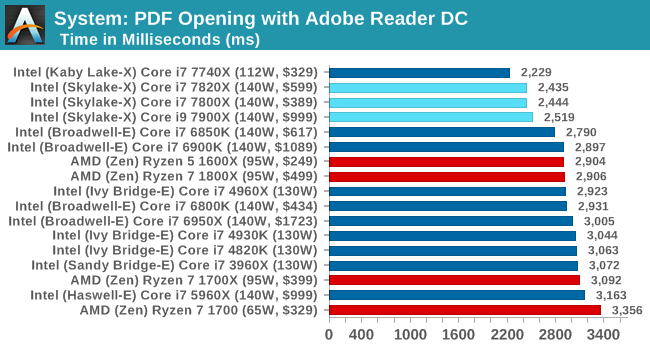
The extra frequency of the new processors is helping when it comes to opening our monster PDF, but also the extra L2 cache is likely having an effect as well.
FCAT Processing
One of the more interesting workloads that has crossed our desks in recent quarters is FCAT - the tool we use to measure stuttering in gaming due to dropped or runt frames. The FCAT process requires enabling a color-based overlay onto a game, recording the gameplay, and then parsing the video file through the analysis software. The software is mostly single-threaded, however because the video is basically in a raw format, the file size is large and requires moving a lot of data around. For our test, we take a 90-second clip of the Rise of the Tomb Raider benchmark running on a GTX 980 Ti at 1440p, which comes in around 21 GB, and measure the time it takes to process through the visual analysis tool.
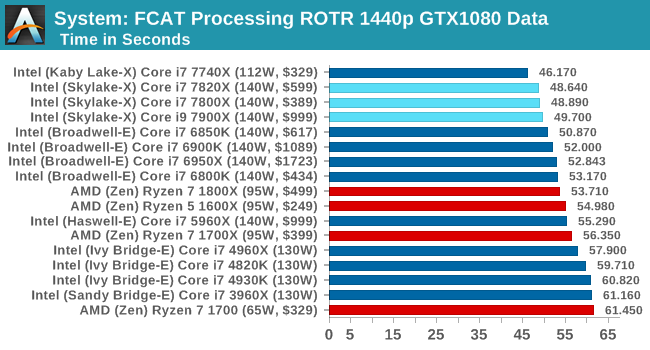
FCAT takes in a frame, processes it and dumps it, all on a single thread. The quicker you get through the workload the better, and frequency is supreme, hence we get the 7820X followed by the 7800X then the 7900X. Even though the 7900X has the higher turbo here, the results are with the margin expected.
3D Particle Movement v2.1
This is the latest version of the self-penned 3DPM benchmark. The goal of 3DPM is to simulate semi-optimized scientific algorithms taken directly from my doctorate thesis. Version 2.1 improves over 2.0 by passing the main particle structs by reference rather than by value, and decreasing the amount of double->float->double recasts the compiler was adding in. It affords a ~25% speed-up over v2.0, which means new data.
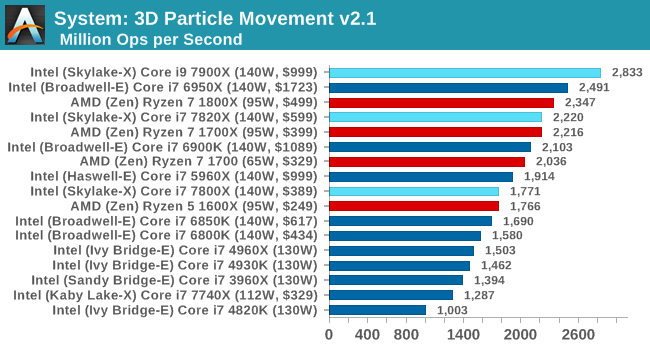
Give 3DPMv2.1 some cores, and it will show you the world / some numbers. The 1800X and 6950X were gunning for top spot, but the extra frequency of the 7900X wins here.
DigiCortex 1.20
Despite being a couple of years old, the DigiCortex software is a pet project for the visualization of neuron and synapse activity in the brain. The software comes with a variety of benchmark modes, and we take the small benchmark which runs a 32k neuron/1.8B synapse simulation. The results on the output are given as a fraction of whether the system can simulate in real-time, so anything above a value of one is suitable for real-time work. The benchmark offers a 'no firing synapse' mode, which in essence detects DRAM and bus speed, however we take the firing mode which adds CPU work with every firing.
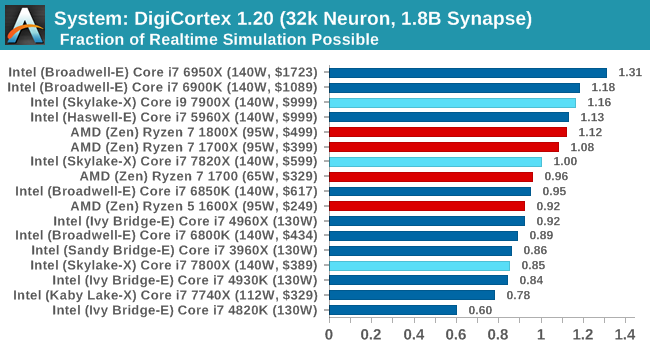
DigiCortex loves a bit of memory, although when speaking with the developer, there can some instances where the beast needs to be fed. Losing the inclusive L3 might be a factor here, especially with the 7800X all the way down.
Agisoft Photoscan 1.0
Photoscan stays in our benchmark suite from the previous version, however now we are running on Windows 10 so features such as Speed Shift on the latest processors come into play. The concept of Photoscan is translating many 2D images into a 3D model - so the more detailed the images, and the more you have, the better the model. The algorithm has four stages, some single threaded and some multi-threaded, along with some cache/memory dependency in there as well. For some of the more variable threaded workload, features such as Speed Shift and XFR will be able to take advantage of CPU stalls or downtime, giving sizeable speedups on newer microarchitectures.
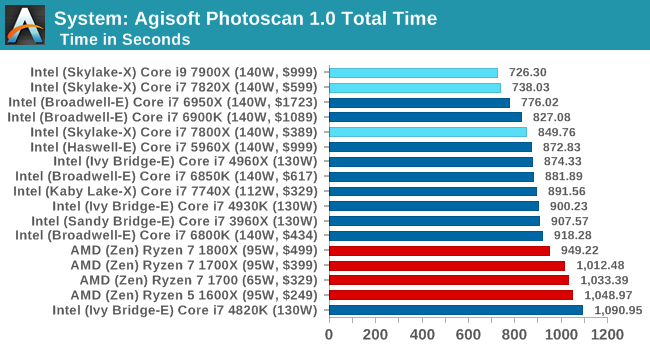
Photoscan is a mixed bag of operations, going through single thread sections to multithread and a range of cache/memory bandwidth requirepements. There's not much difference between thw 10 core and the 8 core, but the frequency helps against Broadwell-E.










264 Comments
View All Comments
Tuna-Fish - Tuesday, June 20, 2017 - link
Just a tiny nitpick about the cache hierarchy table:TLBs are grouped with cache levels, that is, L1TLBs are with the L1 caches and the L2 TLB is with the L2 cache, as if the level of TLB is associated with the level of cache. This is not how they work -- any request only has to have it's address translated once, when it's loaded from the L1 cache. If there is a miss when accessing the L1 TLB, the L2 TLB is accessed before the L1 cache is.
PeterCordes - Monday, July 3, 2017 - link
This common mistake bugs me too! The transistors for the TLB's 2nd level are probably not even near the L2 cache. (And the L2 cache is physically indexed / physically tagged, so it doesn't care about translations or virtual addresses at all). The multi-level TLB is a separate hierarchy from the normal caches.I also commented earlier to point out several other errors in [the uarch details](http://www.anandtech.com/comments/11550/the-intel-... e.g. mixing up the register-file sizes with the scheduler size.
yeeeeman - Tuesday, June 20, 2017 - link
What this review shows just how good of a deal AMD Ryzen CPUs are. I mean, R7 1700 is like 300$ and it keeps up in many of the tests with the big boys from Intel.Carmen00 - Tuesday, June 20, 2017 - link
Small typo on the first page, Ian: "For $60 less than the price of the Core i7-7800X...". But the comparison shows $389 vs $299, which is a $90 difference. Otherwise a fantastic, in-depth review, thank you very much!Ian Cutress - Tuesday, June 20, 2017 - link
Official MSRPs haven't changed. What distributors do with their stock is a different story.Carmen00 - Wednesday, June 21, 2017 - link
I'm talking about the MSRPs. There's a table ("Comparison: Core i7-7800X vs. Ryzen 7 1700") on Page 1 with the MSRPs as $299 and $389, a $90 difference. The text just above this table says that there's a $60 difference, but 389-299=90, not 60. So either the text is incorrect, or the MSRPs in the table are incorrect.Tephereth - Tuesday, June 20, 2017 - link
Missing temps and in-game benchmarks... u're the only one in the whole web that has an 7800x to test, so please post those :(Gothmoth - Tuesday, June 20, 2017 - link
after reading a dozend reviews i say:great now we have the choice between two buggy platforms.... well done.
i am not going to be a bios betatester for AMD or Intel.
these two release are the worst in many years i would say.
i hope AMD has threadripper ironed out.
AntDX316 - Tuesday, June 20, 2017 - link
The new processors are in totally another level/league/class. It dominates in everything and more except a couple benches.AnandTechReader2017 - Tuesday, June 20, 2017 - link
Of course they are, Ryzen is mainstream, Thread Ripper is the competitor.Thread Ripper will be quite interesting, the scaling of the "infinity fabric" will come to the fore and show if AMD's new architecture is a worthy competitor.